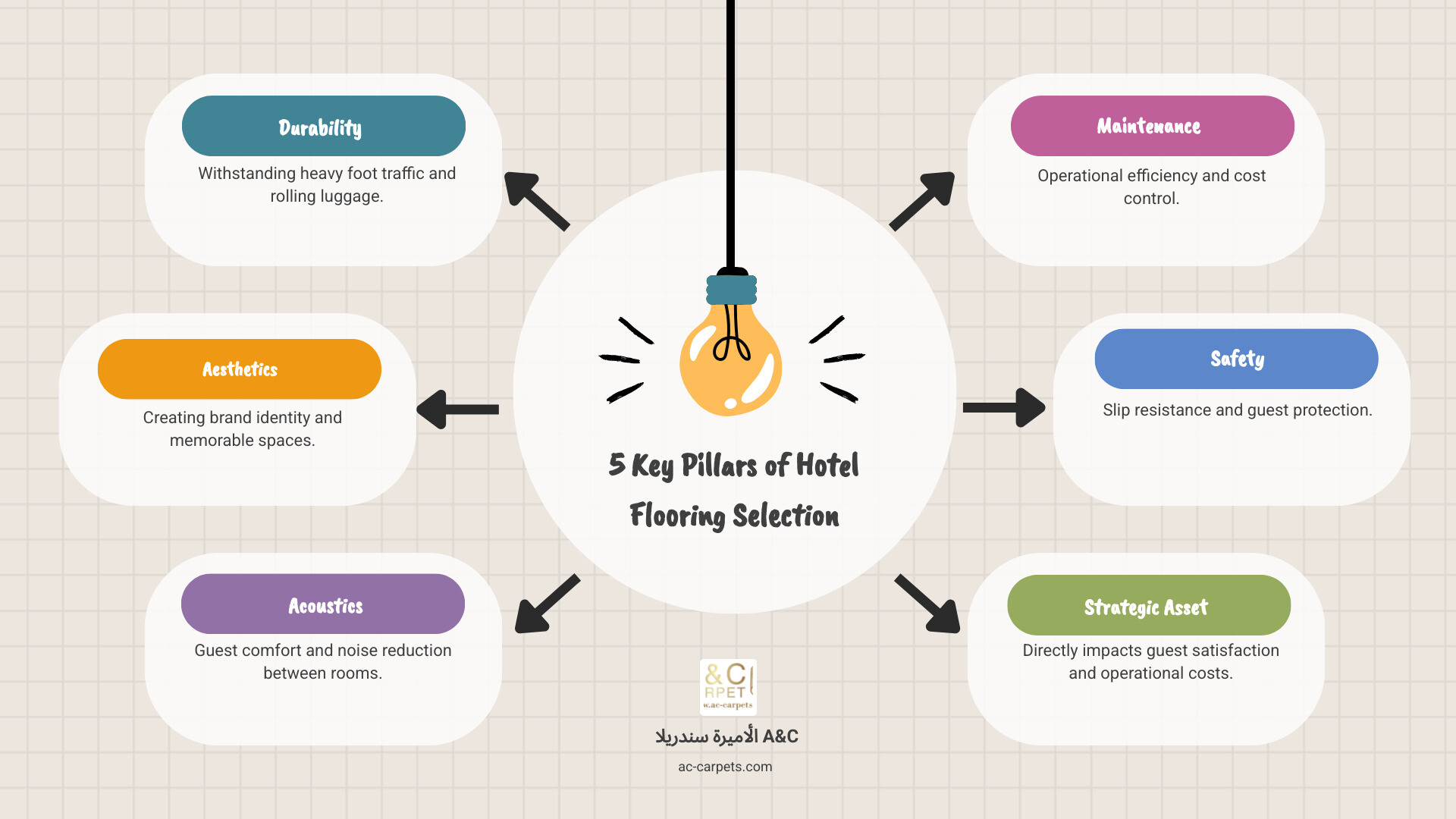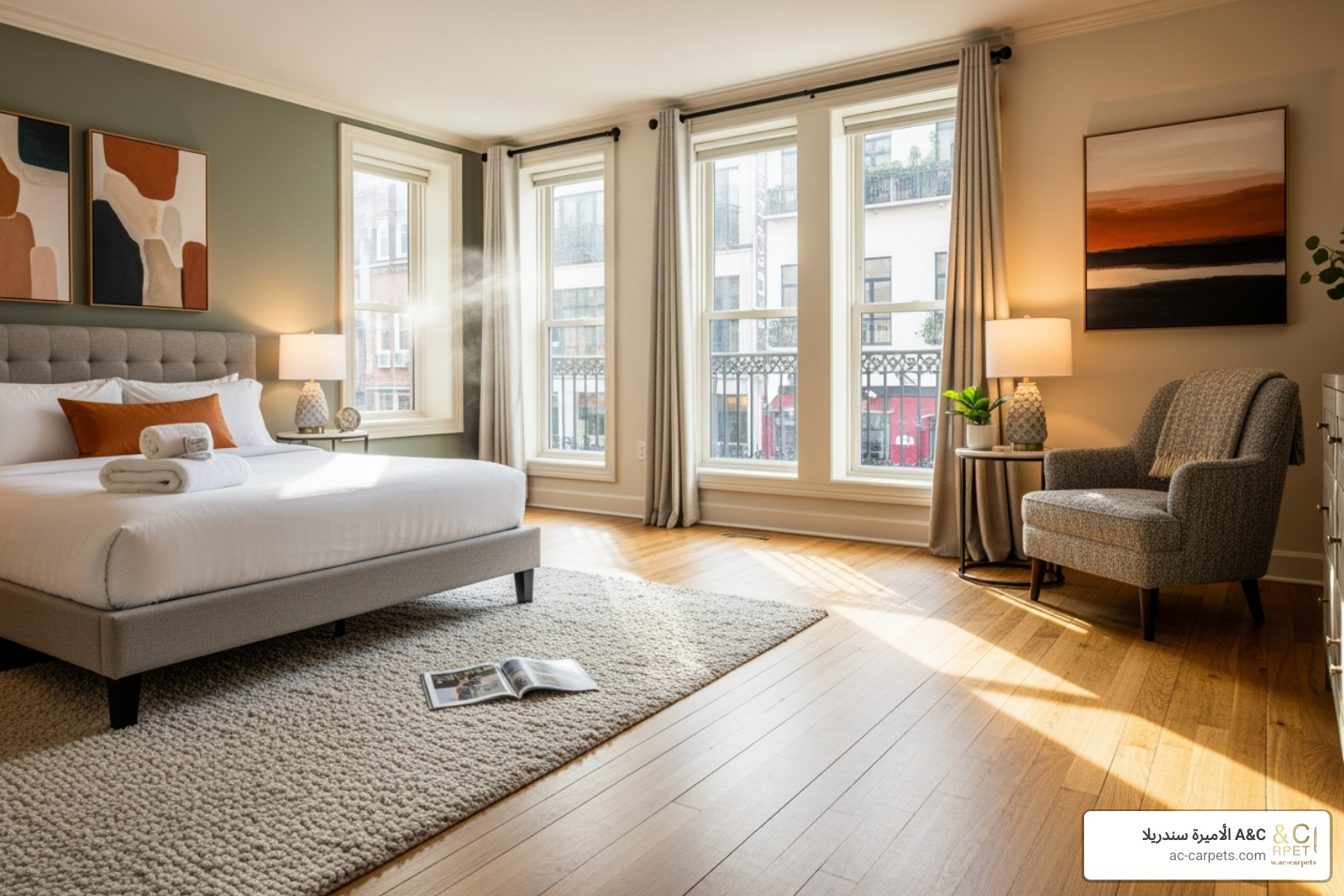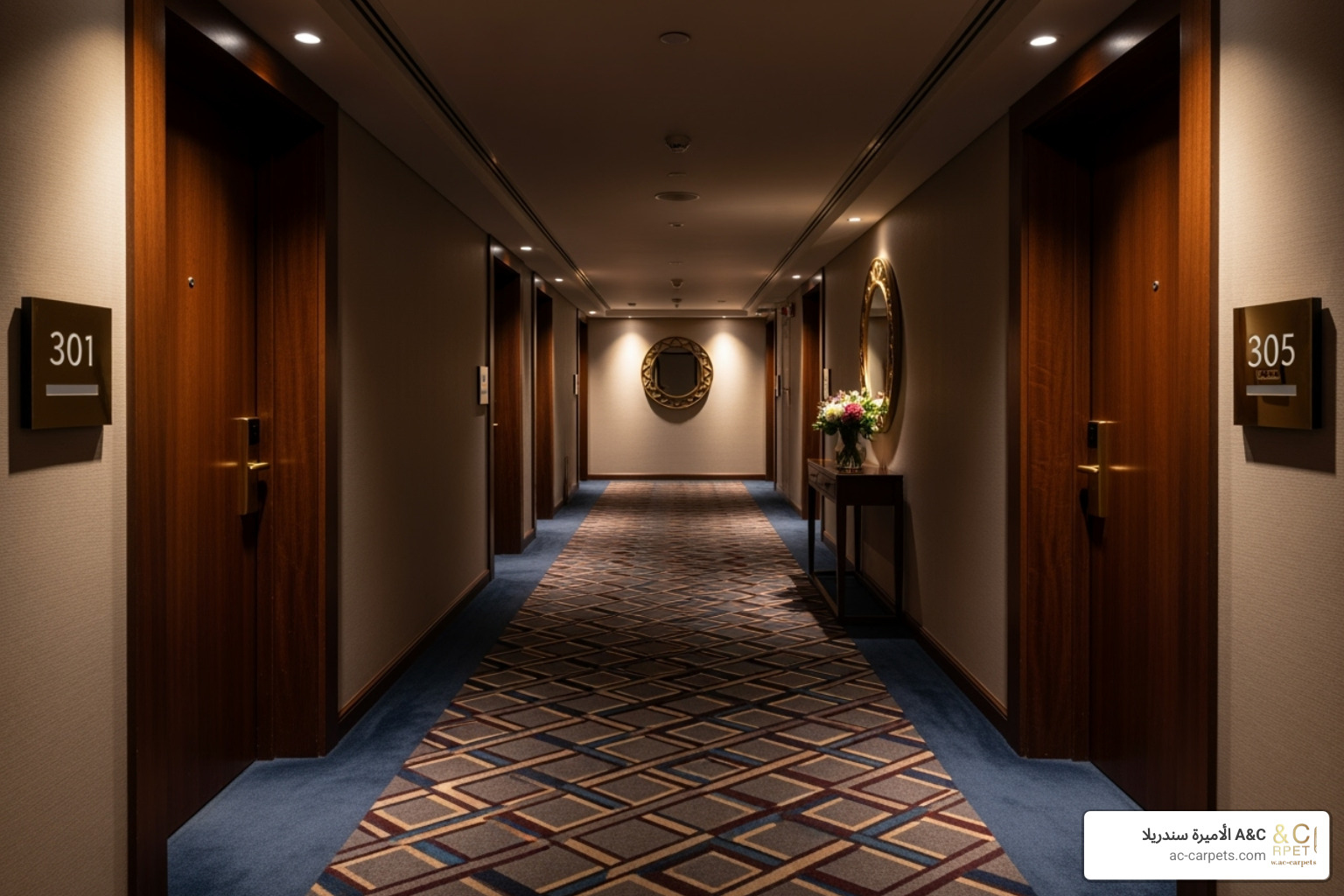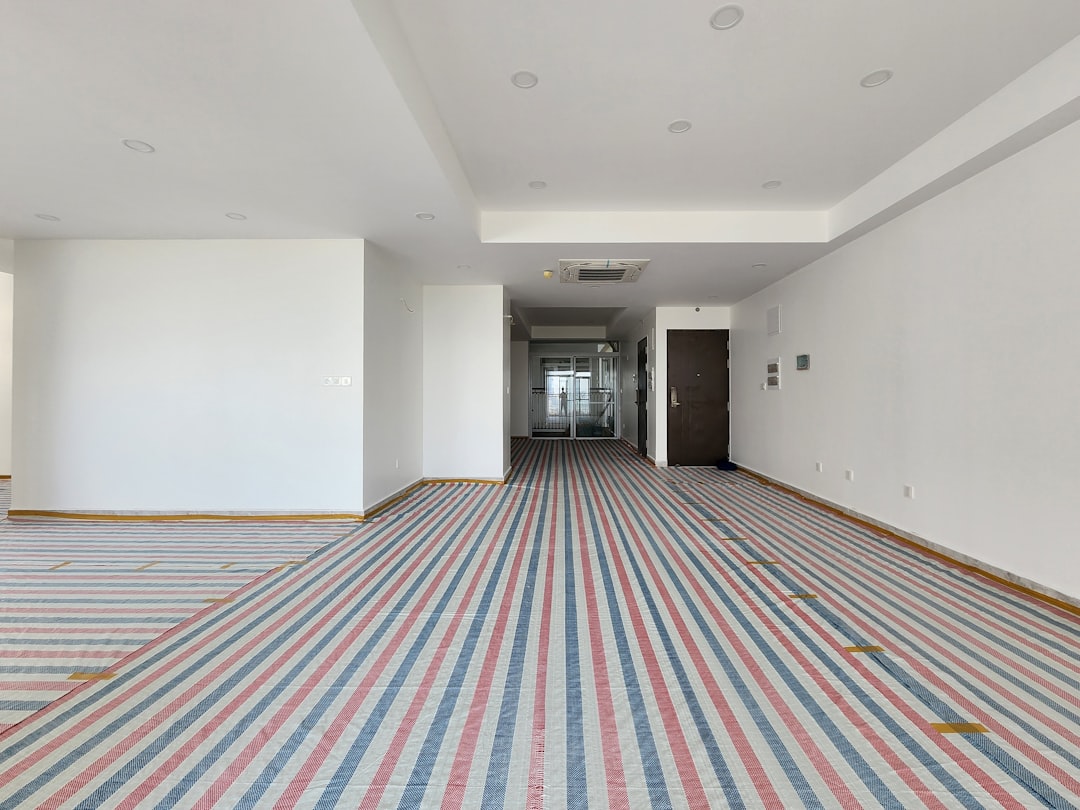Commercial Flooring for Hotels: Top 5 Ultimate Guide
Why Commercial Flooring Choices Define Hotel Success
Commercial flooring for hotels is more than a surface to walk on; it’s a strategic asset impacting guest satisfaction, brand perception, and operational costs. The right choice improves a property’s reputation and cuts long-term expenses, while poor selections lead to costly replacements and negative reviews.
Quick Answer: Best Commercial Flooring Options for Hotels
- Luxury Vinyl Tile (LVT): Most versatile, water-resistant, mimics wood/stone
- Broadloom Carpet: Maximum comfort and sound absorption for guest rooms
- Carpet Tiles: Easy maintenance, replaceable sections, design flexibility
- Porcelain Tile: Ultimate durability for high-traffic lobbies and bathrooms
- Epoxy Flooring: Seamless, modern look for contemporary spaces
Hotel flooring must withstand challenges residential options can’t: rolling luggage, high foot traffic, spills, and 24/7 use. As one industry expert notes, “Hotel guests want to abandon the stress of their everyday lives”—and flooring is key to creating that escape through comfort, aesthetics, and acoustics.
The global commercial flooring market, valued at $135.5 billion in 2022, grows at 5.7% annually, largely driven by hospitality. Hotels need flooring that balances five factors: durability, aesthetics, acoustics, maintenance, and safety.
I’m Ramy Saber, a Civil Engineer and founder of الأميرة سندريلا A&C, specializing in innovative commercial flooring for hotels in Egypt. My experience in construction and facility management confirms that the right flooring transforms guest experiences and reduces operational headaches.

The Role of Flooring in Guest Experience and Hotel Branding
A guest’s first impression is formed the moment they step into your hotel, and the flooring beneath their feet is a powerful tool for shaping that experience. Commercial flooring for hotels is instrumental in creating memorable stays and building brand identity.

Clean, well-maintained floors communicate quality and attention to detail, while worn surfaces suggest neglect. Guests notice details like the sound of their footsteps or the feel of carpet, which contribute to their overall impression. Fresh, comfortable flooring builds brand trust, whereas poor flooring can undermine even the best service.
Setting the Scene: Ambiance and Theme
Flooring is a key part of your hotel’s story. Material, color, and pattern choices define your brand, from sleek, high-gloss surfaces for modern luxury to warm wood-look planks for a cozy retreat.
Color psychology is crucial: neutral tones are calming, bold patterns energize, and deep colors signal sophistication. Texture and pattern reinforce the theme, whether it’s the inviting feel of a boutique hotel or the smooth finish of timeless elegance.
This thematic design consistency across the lobby, restaurant, and guest rooms creates a polished, intentional experience for your guests.
The Sound of Silence: Acoustics in Hospitality
Flooring choice significantly impacts noise levels, which can be the difference between a five-star review and a complaint. Unwanted sound from hallways or adjacent rooms can ruin a guest’s stay, and commercial flooring for hotels is a key tool in noise management.
Carpet excels at sound absorption, with its fibers trapping sound waves. Quality underlayment and backing further reduce noise transmission.
Hard surfaces like tile and LVT require acoustic planning. The sound of foot traffic and rolling luggage can be disruptive, so these surfaces are often paired with area rugs or specified with built-in sound-dampening features.
The goal is to create quiet, relaxing spaces. When guests aren’t distracted by noise, they sleep better and remember your hotel fondly, turning them into loyal customers.
Top Commercial Flooring Options for Hotels: A Material Comparison
Choosing the right commercial flooring for hotels requires balancing cost, durability, maintenance, and ambiance. Each material has unique traits, and understanding them is key to selecting the best option for your property, whether you prioritize luxury or practicality.
| Material | Average Cost (Installation) | Durability | Maintenance Level | Best For (Ambiance) |
|---|---|---|---|---|
| LVT | Mid-range | High | Low | Modern, versatile, natural look |
| Carpet | Mid-range to High | Moderate-High | Moderate-High | Cozy, luxurious, quiet |
| Tile (Porcelain/Ceramic) | Mid-range to High | Very High | Low | Neat, classic, clean, upscale |
| Epoxy | Mid-range to High | Very High | Low | Modern, industrial chic, seamless |
The Role of Carpet in Commercial Flooring for Hotels: Broadloom vs. Carpet Tiles
Carpet is essential in commercial flooring for hotels for creating a welcoming, comfortable atmosphere. Its soft texture and sound-absorbing qualities significantly improve guest comfort. The two primary choices for hotels are broadloom and carpet tiles, each with distinct advantages.
Broadloom carpet offers a seamless, wall-to-wall luxury ideal for creating visual continuity and a sophisticated feel. Its continuous roll format allows for large-scale patterns and delivers superior plushness. However, installation is more complex, repairs are difficult, and it generates more waste (5-25%).
Carpet tiles are a practical, modular solution offering immense design flexibility. You can mix colors and textures to create custom looks. Their key advantage is easy maintenance: a stained or damaged tile can be quickly replaced. This makes them a budget-friendly and sustainable choice, with installation generating only 1-3% waste.
Luxury Vinyl Tile (LVT): The Versatile Performer
If commercial flooring for hotels had a Swiss Army knife, it would be Luxury Vinyl Tile. LVT adapts beautifully to almost any environment while delivering consistent performance.
LVT’s greatest strength is its ability to mimic natural materials like wood and stone with stunning realism, but without the maintenance drawbacks. It is highly water-resistant, making it ideal for gyms, spas, and bathrooms. With vast design variety, straightforward installation, minimal maintenance, and excellent cost-effectiveness, LVT is an attractive choice for any property.
Tile and Stone: Timeless Elegance and Durability
Tile and stone are timeless choices for commercial flooring for hotels seeking elegance and durability. Ceramic and porcelain tiles, especially porcelain, are incredibly tough, handling heavy traffic and resisting stains in busy lobbies. They offer a wide variety of designs to suit any aesthetic.
Natural stone like marble provides unparalleled luxury, though it requires more specialized care. While grout maintenance is a factor, modern products have minimized this issue. The longevity and ease of cleaning of tile and stone make them excellent long-term investments for maintaining a high-end look.
Other Innovative Commercial Flooring for Hotels
Innovative options are expanding hotel design possibilities. Epoxy flooring offers a seamless, modern finish that is non-porous, easy to clean, and customizable. Laminate flooring provides a cost-effective, low-maintenance way to achieve a hardwood look in guest rooms.
As an Egyptian factory specializing in modern carpet alternatives, we at الأميرة سندريلا A&C provide unique, high-quality solutions that combine style with the practicality modern hotels demand. These evolving options give property managers more tools to create memorable guest experiences while managing costs.
Strategic Flooring Selection for Different Hotel Zones
Different hotel zones have unique flooring needs. Commercial flooring for hotels must be selected strategically for each space, as what works in a guest room is unsuitable for a lobby or kitchen.

Lobbies & Reception Areas
The lobby sets the first impression and must withstand immense traffic from guests and luggage. The flooring must be both durable and visually impressive.
Porcelain tile is a top choice for its near-indestructible nature and sophisticated look. Luxury Vinyl Tile (LVT) offers great versatility, mimicking high-end materials with practical durability. For added luxury and acoustic control, custom broadloom carpet creates a grand, welcoming entrance.
Guest Rooms & Suites
Guest rooms are personal retreats where comfort and practicality are paramount. Carpet (broadloom or tile) is a top choice for its cozy feel and crucial sound absorption, which prevents noise transfer between rooms.
LVT is also popular, especially for business hotels, due to its stain resistance and ease of cleaning. Laminate flooring is a durable, budget-friendly option that offers a modern hardwood look.
Understanding how to balance guest comfort and operational needs is key when choosing the best flooring for hotel rooms.
Restaurants, Bars & Dining Spaces
Restaurant and bar flooring must be durable, safe, and easy to clean while creating the right ambiance. LVT is excellent for dining areas due to its spill resistance and design versatility. Epoxy flooring provides a seamless, hygienic, and modern look ideal for bars. Porcelain tile offers timeless elegance and durability for traditional spaces, though grout requires regular maintenance.
Bathrooms, Spas & Pool Areas
In wet zones like bathrooms, spas, and pool areas, flooring must be waterproof, slip-resistant, and hygienic. Porcelain tile is a dominant choice as it’s waterproof, durable, and available in slip-resistant textures. Large-format tiles can reduce grout lines and maintenance.
Safety vinyl and specialized LVT are also excellent options, especially when installed with flash coving (curving the floor up the wall) to create a seamless, easy-to-clean surface. Prioritizing slip resistance and hygiene is essential for creating a safe and serene environment.
Key Technical Considerations for Commercial Flooring for Hotels
Beyond aesthetics, the technical specifications of commercial flooring for hotels determine its longevity, performance, and return on investment. A floor that fails prematurely is a business liability. Understanding these technical details is crucial to making a sound investment.
Durability and Maintenance in High-Traffic Areas
Hotel floors must withstand intense wear from luggage and foot traffic. For carpets, look for durability ratings like EN 1307 (Class 33 for heavy commercial use) to ensure long-term appearance retention. For hard surfaces, the thickness of wear layers on LVT and laminate is critical, while porcelain tile’s inherent hardness provides natural durability.
Stain resistance and ease of cleaning are vital; non-porous surfaces like LVT and epoxy are ideal. Surprisingly, carpet with cushion backing is one of the most durable floor coverings for high-traffic zones, offering both comfort and resilience.
Safety First: Slip Resistance and Hygiene
Guest safety is paramount. Commercial flooring for hotels must have adequate slip resistance, measured by the Coefficient of Friction (COF), especially in wet areas. ADA compliance is also essential for accessibility.
For hygiene, seamless flooring like epoxy is advantageous as it eliminates joints where bacteria can grow. Materials with built-in anti-microbial properties offer another layer of protection. Flash coving, creating a seamless floor-to-wall transition, is ideal for kitchens and bathrooms to improve cleanliness.
Sustainability and Indoor Air Quality (IAQ)
Modern guests value sustainability and healthy environments. Low-VOC (Volatile Organic Compound) materials are essential for good indoor air quality (IAQ), preventing guest discomfort.
Choosing flooring with recycled content and from manufacturers who avoid harmful additives is a responsible choice. Flooring that contributes to green building certifications like LEED can attract eco-conscious guests. Selecting sustainable options protects guest well-being and the environment, which is good for business.
Frequently Asked Questions about Hotel Flooring
Choosing commercial flooring for hotels is a major investment, so it’s natural to have questions. Here are answers to three of the most common inquiries we receive.
What is the most durable flooring for a high-traffic hotel lobby?
Porcelain tile is our top recommendation for its extreme durability, stain resistance, and long-lasting upscale appearance. High-quality, commercial-grade Luxury Vinyl Tile (LVT) with a thick wear layer is a close second, offering practical durability with the look of natural materials. For acoustic benefits and a luxurious feel, high-density broadloom carpet (rated EN 1307 Class 33) is also an excellent, resilient choice. The best option depends on balancing your hotel’s aesthetic with these practical needs.
How does flooring choice impact a hotel’s operational budget?
Flooring impacts the budget in three ways: initial cost (materials and installation), daily maintenance (labor and supplies), and long-term replacement. Easy-to-clean materials like LVT and tile reduce daily labor costs. Investing in durable, commercial-grade flooring with a lifespan of 15-20 years is more cost-effective than cheaper options that may need replacement in 5-7 years. A higher upfront cost often leads to substantial long-term savings.
Are carpet tiles or broadloom better for hotel guest rooms?
The choice depends on your priorities. Broadloom carpet offers a seamless, luxurious feel with excellent sound absorption, creating a high-end, quiet environment. However, repairs can be difficult and costly. Carpet tiles are the practical choice for easy maintenance. Individual tiles can be replaced if stained or damaged, minimizing downtime and expense. They also offer great design flexibility. For rooms with high turnover, carpet tiles are often the smarter long-term investment. At الأميرة سندريلا A&C, we find both work well in Egyptian hotels when quality materials are chosen to match operational needs.
Conclusion
Choosing the right commercial flooring for hotels is a strategic investment in your brand and guest experience. It communicates your commitment to quality, comfort, and detail. A well-chosen floor performs under pressure, provides acoustic comfort, and maintains its appeal long-term.
Modern flooring successfully balances durability with comfort and aesthetics with practicality. Whether you select LVT, porcelain tile, broadloom, or carpet tiles, the key is matching the material’s strengths to your hotel’s specific zones and operational needs.
At الأميرة سندريلا A&C, we honor the tradition of Egyptian hospitality with innovative, modern flooring solutions that are both neat and practical. We believe your floors should work as hard as you do, looking beautiful while handling whatever your guests bring through the door.
Your flooring is a silent ambassador for your brand and a smart investment in your hotel’s future success.
Explore our complete range of flooring solutions and let us help you create the perfect foundation for unforgettable guest experiences.

